#healthcare resilience training
Text
Dr. Julie Donley Coaching for Healthcare Leaders

Website: https://www.drjuliedonley.com
Address: Greater Philadelphia, Pennsylvania, United States
Dr. Julie Donley offers a range of services focused on leadership coaching, primarily for healthcare professionals. Services include individual leadership coaching via phone or Zoom, emotional intelligence assessments, leadership development, group coaching, and keynote speaking. Her approach integrates compassionate leadership with business objectives, aiming to create a culture of appreciation, psychological safety, and high-performing teams in healthcare settings.
Facebook: https://www.facebook.com/virtualassistantlori/
Youtube: https://www.youtube.com/channel/UC_oUnKYA7Ky0GGeD5UkcdCA
Linkedin: https://www.linkedin.com/in/drjuliedonley/
Keywords:
online leadership courses
online leadership development
professional development online
online leadership coaching
online team collaboration
digital emotional intelligence
healthcare professional development
online resilience training
healthcare resilience training
online leadership workshops
virtual leadership skills
virtual team dynamics
digital stress management
online emotional intelligence
digital leadership coaching
virtual emotional intelligence
online team development
online personal growth
remote leadership development
digital team collaboration
remote healthcare training
virtual leadership workshops
remote leadership coaching
remote team dynamics
healthcare leadership webinars
remote coaching for professionals
compassionate leadership programs
telecoaching for healthcare
remote workforce empowerment
virtual management skills
digital professional coaching
telehealth leadership skills
online coaching for medical professionals
healthcare workshops online
virtual team building healthcare
digital leadership strategies
healthcare e coaching
virtual emotional wellness
telecoaching in healthcare
healthcare leadership insights
telehealth coaching programs
healthcare webinar series
online stress resilience
virtual professional growth
remote emotional wellness
telecoaching strategies
online team empowerment
digital healthcare training
remote coaching sessions
healthcare leadership webcasts
telehealth management skills
online leadership resilience
digital professional growth
remote healthcare coaching
virtual emotional intelligence training
digital team building healthcare
virtual healthcare leadership
digital team empowerment
online emotional wellness programs
virtual team collaboration skills
online leadership insights
digital healthcare coaching
virtual emotional intelligence coaching
telehealth leadership insights
online leadership empowerment
digital team building strategies
remote leadership workshops
online healthcare coaching
virtual emotional wellness webinars
telecoaching for healthcare leaders
digital healthcare leadership insights
#online leadership courses#online leadership development#professional development online#online leadership coaching#online team collaboration#digital emotional intelligence#healthcare professional development#online resilience training#healthcare resilience training#online leadership workshops#virtual leadership skills#virtual team dynamics#digital stress management#online emotional intelligence#digital leadership coaching#virtual emotional intelligence#online team development#online personal growth#remote leadership development#digital team collaboration#remote healthcare training#virtual leadership workshops#remote leadership coaching#remote team dynamics#healthcare leadership webinars#remote coaching for professionals#compassionate leadership programs#telecoaching for healthcare#remote workforce empowerment#virtual management skills
1 note
·
View note
Text
Beyond Change Healthcare
The continued onslaught of cybersecurity attacks which if anything are only getting worse have impacted the healthcare system in dramatic fashion with the payment network brought down by the attack on Change Healthcare.
Healthcare under Cyber Attack
I keep hoping that we all get better at combatting these attempts to breach our data and that overall vigilance rises as we become more wary of…

View On WordPress
#cyber attacks#cyber awareness#cyber defense#cyber hygiene#cyber resilience#cyber safety#cyber threats#CyberCrime#Cybersecurity#cybersecurity awareness#cybersecurity best practices#cybersecurity challenges#cybersecurity culture#cybersecurity education#cybersecurity measures#cybersecurity news#cybersecurity protocols#cybersecurity resources#cybersecurity risks#cybersecurity solutions#cybersecurity strategy#cybersecurity tips#cybersecurity training#cybersecurity trends#data breach#data encryption#data protection#data security#Digital Health#Healthcare
0 notes
Text
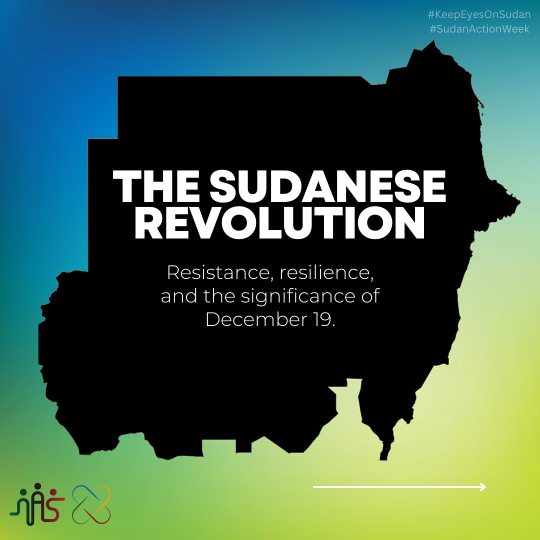
Via NasAlSudan
Learn about the Sudanese revolution, the significance of December 19, and a legacy of resistance and resilience.
Join our call to action today and everyday during Sudan Action Week.
December 19 2023
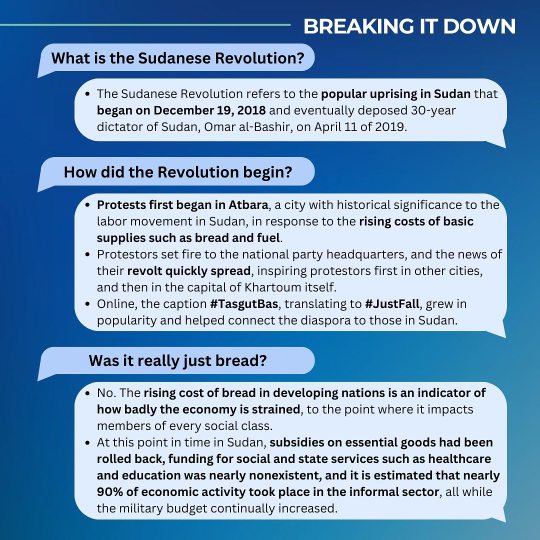
Transcript:
Breaking it down
What is the Sudanese Revolution?
The Sudanese Revolution refers to the popular uprising in Sudan that began on December 19, 2018 and eventually deposed 30-year dictator of Sudan, Omar al-Bashir, on April 11 of 2019.
How did the Revolution begin?
Protests first began in Atbara, a city with historical significance to the labor movement in Sudan, in response to the rising costs of basic supplies such as bread and fuel.
Protestors set fire to the national party headquarters, and the news of their revolt quickly spread, inspiring protestors first in other cities, and then in the capital of Khartoum itself.
Online, the caption #TasgutBas, translating to #JustFall, grew in popularity and helped connect the diaspora to those in Sudan.
Was it really just bread?
No. The rising cost of bread in developing nations is an indicator of how badly the economy is strained, to the point where it impacts members of every social class.
At this point in time in Sudan, subsidies on essential goods had been rolled back, funding for social and state services such as healthcare and education was nearly nonexistent, and it is estimated that nearly 90% of economic activity took place in the informal sector, all while the military budget continually increased.
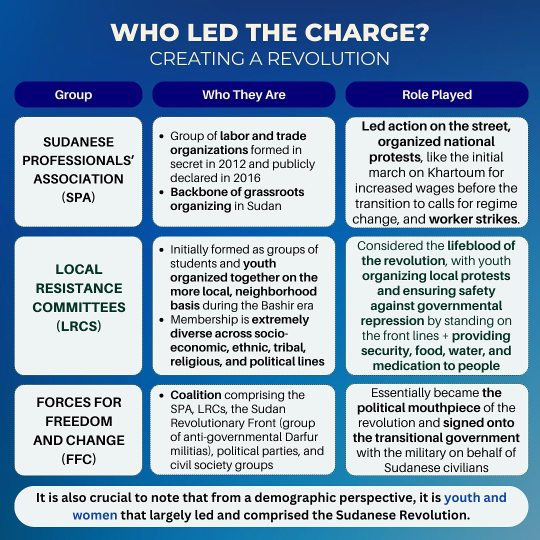
Transcript:
Who led the charge? Creating a revolution
Group: Sudanese Professional's association (SPA)
Who they are:
Group of labor and trade organizations formed in secret in 2012 and publicly declared in 2016
Backbone of grassroots organizing in Sudan
Role played:
Led action on the street, organized national protests, like the initial march on Khartoum for increased wages before the transition to calls for regime change, and worker strikes.
Group: Local Resistance Committees (LRCS)
Who they are:
Initially formed as groups of students and youth organized together on the more local, neighbourhood basis during the Bashir era
Membership is extremely diverse across socio-economic, ethnic, tribal, religious, and political lines
Role played:
Considered the lifeblood of the revolution, with youth organizing local protests and ensuring safety against governmental repression by standing on the front lines + providing security, food, water, and medication to people
Group: Forces for freedom and change (FFC)
Who they are:
Coalition comprising the SPA, LRCS, the Sudan Revolutionary Front (group of anti-governmental Darfur militias), political parties, and civil society groups
Role played:
Essentially became the political mouthpiece of the revolution and signed onto the transitional government with the military on behalf of Sudanese civilians
It is also crucial to note that from a demographic perspective, it is youth and women that largely led and comprised the Sudanese Revolution.
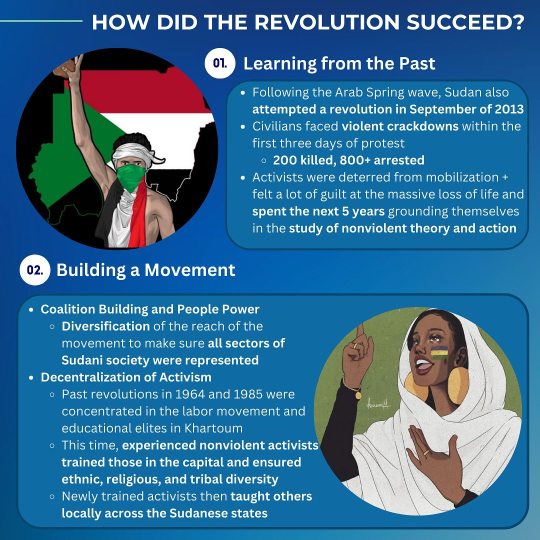
Trabscript:
How did the revolution succeed?
01. Learning from the Past
Following the Arab Spring wave, Sudan also attempted a revolution in September of 2013
Civilians faced violent crackdowns within the first three days of protest. 200 killed, 800+ arrested
Activists were deterred from mobilization + felt a lot of guilt at the massive loss of life and spent the next 5 years grounding themselves in the study of nonviolent theory and action
02. Building a Movement
Coalition Building and People Power
Diversification of the reach of the movement to make sure all sectors of Sudani society were represented
Decentralization of Activism
Past revolutions in 1964 and 1985 were concentrated in the labor movement and educational elites in Khartoum
This time, experienced nonviolent activists trained those in the capital and ensured ethnic, religious, and tribal diversity
Newly trained activists then taught others locally across the Sudanese states
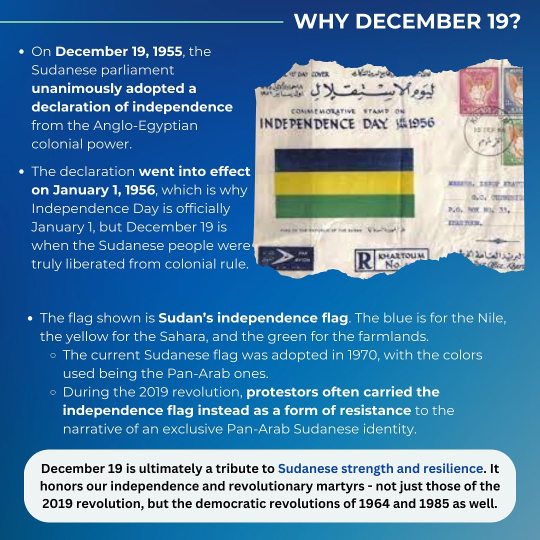
Transcript:
Why december 19?
On December 19, 1955, the Sudanese parliament unanimously adopted a declaration of independence from the Anglo-Egyptian colonial power.
The declaration went into effect on January 1, 1956, which is why Independence Day is officially January 1, but December 19 is when the Sudanese people were truly liberated from colonial rule.
The flag shown is Sudan's independence flag. The blue is for the Nile, the yellow for the Sahara, and the green for the farmlands.
The current Sudanese flag was adopted in 1970, with the colors used being the Pan-Arab ones.
During the 2019 revolution, protestors often carried the independence flag instead as a form of resistance to the narrative of an exclusive Pan-Arab Sudanese identity.
December 19 is ultimately a tribute to Sudanese strength and resilience. It honors our independence and revolutionary martyrs - not just those of the 2019 revolution, but the democratic revolutions of 1964 and 1985 as well.
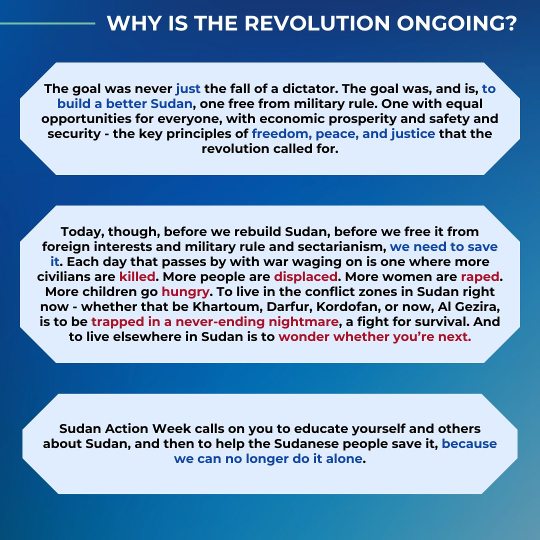
Transcript:
Why is the revolution ongoing?
The goal was never just the fall of a dictator. The goal was, and is, to build a better Sudan, one free from military rule. One with equal opportunities for everyone, with economic prosperity and safety and security - the key principles of freedom, peace, and justice that the revolution called for.
Today, though, before we rebuild Sudan, before we free it from foreign interests and military rule and sectarianism, we need to save it. Each day that passes by with war waging on is one where more civilians are killed. More people are displaced. More women are raped. More children go hungry. To live in the conflict zones in Sudan right now - whether that be Khartoum, Darfur, Kordofan, or now, Al Gezira, is to be trapped in a never-ending nightmare, a fight for survival. And to live elsewhere in Sudan is to wonder whether you're next.
Sudan Action Week calls on you to educate yourself and others about Sudan, and then to help the Sudanese people save it, because we can no longer do it alone.
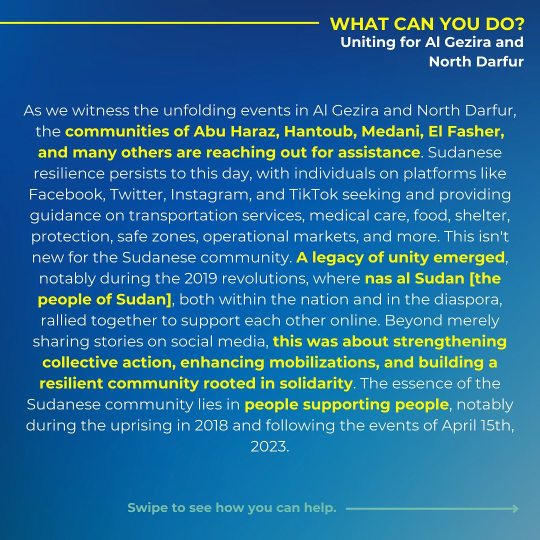
Transcript:
What can you do? Uniting for Al Gezira and North Darfur
As we witness the unfolding events in Al Gezira and North Darfur, the communities of Abu Haraz, Hantoub, Medani, El Fasher, and many others are reaching out for assistance. Sudanese resilience persists to this day, with individuals on platforms like Facebook, Twitter, Instagram, and TikTok seeking and providing guidance on transportation services, medical care, food, shelter, protection, safe zones, operational markets, and more. This isn't new for the Sudanese community. A legacy of unity emerged, notably during the 2019 revolutions, where nas al Sudan [the people of Sudan], both within the nation and in the diaspora, rallied together to support each other online. Beyond merely sharing stories on social media, this was about strengthening collective action, enhancing mobilizations, and building a resilient community rooted in solidarity. The essence of the Sudanese community lies in people supporting people, notably during the uprising in 2018 and following the events of April 15th, 2023
Swipe to see how you can help.
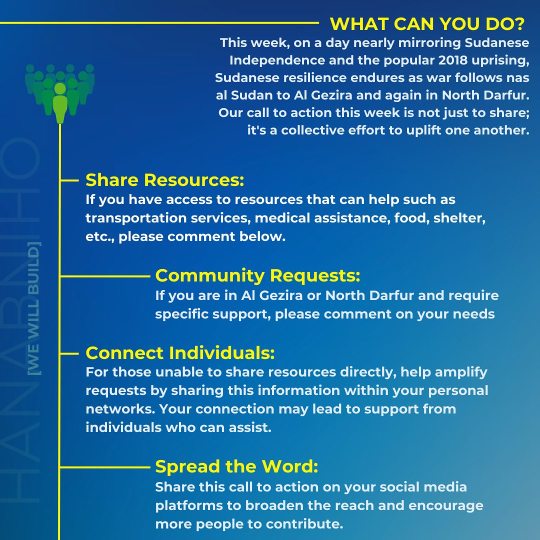
Transcript:
What can you do?
This week, on a day nearly mirroring Sudanese Independence and the popular 2018 uprising, Sudanese resilience endures as war follows nas al Sudan to Al Gezira and again in North Darfur. Our call to action this week is not just to share; it's a collective effort to uplift one another.
Share Resources:
If you have access to resources that can help such as transportation services, medical assistance, food, shelter, etc., please comment below.
Community Requests:
If you are in Al Gezira or North Darfur and require specific support, please comment on your needs
Connect Individuals:
For those unable to share resources directly, help amplify requests by sharing this information within your personal networks. Your connection may lead to support from individuals who can assist.
Spread the Word:
Share this call to action on your social media platforms to broaden the reach and encourage more people to contribute.
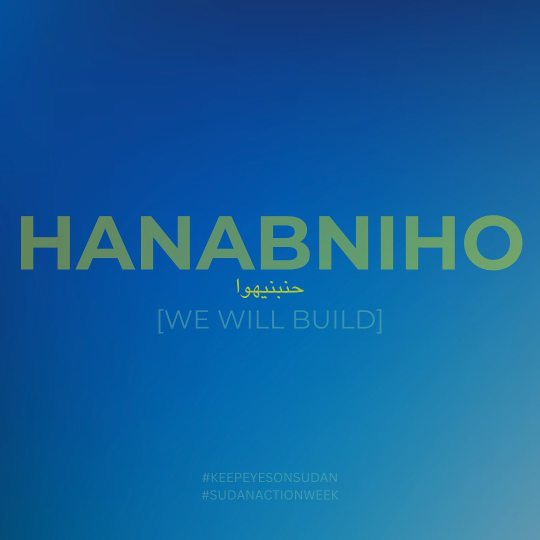
Transcript:
Hanabniho
حنبنيهوا
[We will rebuild]
#keepEyesOnSudan
#SudanActionWeek
923 notes
·
View notes
Text
10 Healthy Lifestyles
1. Balanced Diet
Eat a variety of nutrient-rich foods, including fruits, vegetables, lean proteins, whole grains, and healthy fats.
Avoid processed foods, sugary snacks, and excessive alcohol intake.
Practice portion control to maintain a healthy weight.
2. Regular Exercise
Incorporate physical activity into your daily routine, aiming for at least 150 minutes of moderate-intensity exercise per week.
Include a mix of cardiovascular exercises, strength training, and flexibility exercises.
Find activities you enjoy to stay motivated and consistent.
3. Sufficient Hydration
Drink plenty of water throughout the day to stay hydrated and support bodily functions.
Limit sugary drinks and opt for water, herbal teas, or infused water instead.
4. Quality Sleep
Aim for 7-9 hours of quality sleep each night to support overall health and well-being.
Establish a bedtime routine and create a sleep-friendly environment.
5. Stress Management
Practice stress-reduction techniques such as deep breathing, meditation, yoga, or spending time in nature.
Prioritize self-care activities and find healthy outlets for stress relief.
6. Regular Medical Check-ups
Schedule regular medical check-ups and screenings to monitor your health and detect any potential issues early on.
Follow up with healthcare professionals as needed and adhere to their recommendations.
7. Mental Health Awareness
Pay attention to your mental health and seek support if needed.
Practice self-care, engage in hobbies, and prioritize activities that bring you joy and fulfillment.
8. Social Connections
Cultivate strong social connections and maintain relationships with friends, family, and community.
Spend quality time with loved ones and engage in meaningful interactions.
9. Limiting Sedentary Behavior
Reduce sedentary behavior by incorporating movement into your daily activities.
Take breaks from prolonged sitting and find opportunities to be active throughout the day.
10. Positive Mindset
Cultivate a positive mindset and focus on gratitude, optimism, and resilience.
Practice self-compassion and embrace a growth mindset to navigate life's challenges.
By adopting these healthy lifestyles, you can enhance your overall well-being and lead a fulfilling life.
FOR LEARN HOW TO CREAT HEALTHY LIFESTYLE TAKE THIS EBOOK IN HERE : https://healthyus.gumroad.com/l/lifestyle
#girlblog#girlblogger#girlblogging#that girl#dream girl#it girl#self care#self love#glow up#becoming that girl#self help#self development#self improvement#wonyoungism#pink pilates princess aesthetic#pink pilates girl#pink pilates princess#green juice girl aesthetic#green juice girl#clean girl aesthetic#clean girl#health#health aesthetic#health blog#fitness#fitness blog#girly#girly stuff#girly aesthetic#girly things
33 notes
·
View notes
Text
It's soooo funny being in healthcare bc like no matter how high the suicide rate skyrockets and no matter how many of my fellow med students drop dead around me and no matter what the mental health climate is like, the onus of responsibility is always! placed on the healthcare worker. Like you know why you're burnt out? It's bc you haven't done enough resiliency training! You know why we have a doctor and nurse shortage? They just didn't have big enough cajones to deal with the physical and verbal assault from patients while going into hour 100 of their work week! Unfortunately they did not read the fine print where they must gradually destroy parts of themselves until they ultimately cannot recognize who they see in the mirror, sad! We the Institutions would help them with this but it's a slippery slope and if you can't handle the heat stay out of the kitchen, amirite? If you want to help people you sign up to be a martyr, didn't you know? We could give a shit about you but then we might feel guilty when we write this bad yelp review about how long we had to wait bc you're the only primary care doc around bc the other three in the area went clinically insane. Such a shame. But, well, you did ask for it, didn't you?
#just.....idek what to say. it wont change anything.#srry. been a long day and a long week and a long month.#personal#healthcare#mental health#k spirals
36 notes
·
View notes
Text
Join The GreenHorizon Movement!
For a more Solarpunk future
Hey everyone! This is an introduction to GreenHorizon, a movement of necessity for making our world beautiful, green, kind, safe and thriving for all of us.
You would be shocked how many people get extremely angry at me for even suggesting this as a possibility. In our current world, having hope is a radical thing.
The situation in the world now, is so dire there is no ignoring it anymore. Even for me; and I come from relative privilege, to be transparent with you. I'm feeling increasingly worried in very real terms. We have to do this now. I for one can't live with myself if I don't at least try. I want to be able to say I did everything I could to help save us. To save all life on this beautiful unique planet, that might be the only one of its kind.
Is this overconfident and a bit crazy? Maybe. Do we care? No lol. Someone has to try. Someone has to make a first real iteration of a possible and tangible solution. It might as well be us. I hope you'll join. We're going to need your help.
This is an amalgamation of several years of independent interest and study of many different subjects relating to sustainability, ecology, anthropology, history and social justice etc. The authors and creators whose work and content I have studied and been inspired by will be listed in the full guide, which will be out as soon as possible. I have also been inspired by many of you here on tumblr, in the solarpunk sphere.
Here's what the movement stands for:
Permaculture: We advocate for permaculture through food forests and chinampas etc. where nature's symbiotic relationships provide abundance as they always have. It's much more resilient, more productive and is a long term gift for future generations.
Human Rights: We stand firmly behind the advancement of women, children, LGBT+, neurodivergent and disabled people's etc rights. Recognising our integral roles in building a just and equitable society with accommodations to make our lives easier. Also, all healthcare, education, food, water and housing would be free. These are all necessary for human life and should never have been monetised to begin with.
Animal Rights: Protecting the rights of our fellow beings and promoting a world where animals and their habitats are respected and unviolated through rewilding, restoration and ranger drone patrols, as well as strongly scaling down, if not ending all industrial animal agriculture.
Mutual Aid: Embracing a mutual aid/gifting/volunteering based society/culture. We aim to dismantle the out dated notions of profit motive, commerce, currency and the stock market. Fostering a spirit of generosity, solidarity and cooperation instead. Living by the hippocratic oath in a sense.
Decentralized Governing: The government would be small, direct democratically elected and only in charge of defence of the nation from outside forces and representation on the world stage etc. The nation (UK in my case) would be a union of tribes where the majority of decisions would be based on local community consensus, the principles of this movement and doing minimum harm. You would belong to three tribes in a sense. Your local, your city and your national (country) tribe. All humans used to live in tribes, so this will feel like coming home. And no, it won't be like cults. There won't be any one leader of the tribes, they won't be competitive, and members can come and go as they please, and join another tribe should they wish etc.
Sustainable Transportation: We advocate for the gradual shift from car-culture to efficient and eco-friendly solutions such as walking, trains and bicycles, greatly reducing our environmental and noise pollution. Walking and biking for local, trains for longer distances. We would still have planes for international travel, which would be developed with time to be zero emission. Some cars would be used to transport things within cities, during night time where there are much fewer pedestrians and bikes. Also in the countryside while new train lines and bike highways are being built. There won't be trams and buses if it's up to me though, sorry. Because they require a lot of maintenance, materials, make a lot of noise, are virus spreading hotspots, and are a risk to bike and pedestrian safety. Disabled people can get around via electric special bikes, electric wheelchairs and passenger bike taxis.
Community Building: Creating completely walkable neighbourhoods with tribes/communities of about 100 people each. Houses built of durable, natural, sustainable materials suited to the given climate, surrounded by nature, with communal cooking and shared tasks, many of which we would be automated with time and development. All amenities within easy walking distance. Where people check in on and look out for each other, with the added help from mediators. We are not meant to live among strangers. You can also join a different tribe at any time if you wish, you are not tied down in any way. You can also be a member of multiple tribes, if you like to be more nomadic.
Secular spirituality: Reconnecting with our need for narrative and meaning in our lives but without the dogma. Creating culture, rituals, ceremonies and celebrations of gratitude to nature and each other. Open to anyone, including people of other faiths. I will be writing a separate work on this.
Healing Humanity: It is so clear that the meaning of a human life is to do all the things that make a human life unique and worth living ie. spending time with friends and loved ones, pursuing something you’re truly passionate about, creating art, crafting, making music, reading, writing and telling stories, travelling, swimming, spending time in nature witnessing and being one with the sublime, playing with your kids, playing with your pets, having picnics, laughing so hard your face hurts, gardening, drinking tea/coffee, dressing up nice, getting a little drunk, dancing, singing and celebrating, commemorating, making love, doing a sport, learning a new language, building something, stargazing, falling in love, studying something just for the love of the subject, being part of a caring group of people and simply resting as much as your body truly needs. To experience this uniquely beautiful and strange world as a human being is actually a big privilege. Let's make it feel like so again.
All of this and much more will be covered in more detail in the guide/manifesto that will be published soon.
Thanks to @andrew-ism for providing a lot of inspiration for this.
Hit follow, reblog, share and stay tuned for more plans, ideas, stories, creations and other cool things as we work together to make the world as beautiful and thriving as it was always meant to be.
We will be opening to volunteers in the new year. Send us a dm if you're interested.
With much love and much hope
Ava
GreenHorizon
Hope is the seed of progress
#Solarpunk#hopepunk#peaceful revolution#environmentalism#sustainbility#climate change#human rights#lgbt rights#permaculture#climate change solutions#hopecore#lovecore#warmcore#cottagecore#lunarpunk#eco harmony#anti fascism#greenhorizon#by Ava#neurodivergent#women's rights#POC rights#disabled rights#winter#christmas
19 notes
·
View notes
Note
I've read in one of the replies to precious asks that you're a doctor. How would you describe the experience of being a doctor, what type of doctor are you, and what aspects of the profession do you find particularly engaging or compelling?!
Hey, Nonnie :) Well, you've hit on a topic that I could talk about for hours on end, because I'm so passionate about my work. So if you're ready for a bit of a rant, I'm more than happy to oblige!
Being a doctor can be a rewarding and challenging experience. We play a crucial role in the healthcare system, working to diagnose and treat illnesses and injuries, and improve the overall health and well-being of our patients.
Those who know me personally are aware that I'm a certified neurosurgeon, but I haven't limited myself to just one specialization - I'm currently working towards completing my second specialization, which is clinical neuropsychiatry ❤️ 👩⚕️
PROS:
Ability to help people: One of the most fulfilling aspects of being a doctor is the ability to make a difference in people's lives by helping them overcome illnesses and injuries
People and their stories: Another great aspect of being a doctor is the opportunity to work closely with people and to learn about their unique stories and experiences. As a doctor, you become intimately involved in the lives of your patients, and you have the privilege of helping them through some of the most challenging and difficult times of their lives. You get to witness firsthand the resilience and strength of the human spirit, and you have the opportunity to make a real difference in the lives of others. There is truly no greater feeling than helping a patient overcome a serious illness or injury, and seeing the joy and relief on their face as they recover ❤️
Dealing with critical situations: Another imprtant aspect of being a doctor is the training you receive to handle extreme situations. I have seen and dealt with a lot of drastic things in my career and life overall, and I can confidently say that nothing really scares me anymore. It's a unique skill set that you develop as a doctor, being able to remain calm and focused in high-stress situations (it helped me oh so many times!)
Job security: The demand for doctors will always exist, which means there will always be job opportunities for qualified professionals
Opportunities for lifelong learning: As a doctor, you never stop learning. New treatments, technologies, and procedures are constantly being developed, and we must stay up-to-date on the latest advances in our field. This can be intellectually stimulating and rewarding!
Varied career paths: There are numerous specializations within medicine, which allows doctors to pursue a career path that aligns with their interests and strengths
Respect and prestige: Doctors are often held in high regard by society, which can provide a sense of respect and prestige
Collaborative work environment: Neurosurgeons work closely with other healthcare professionals, such as neurologists, radiologists, and nurses, to provide the best possible care to their patients. This collaborative environment can be both challenging and fulfilling
Deathbed phenomena: As a neurosurgeon, I am frequently confronted with the reality of death. Many of my patients come to me in critical condition, and while I always do my best to save their lives, sometimes the outcome is not what we hoped for. Working with dying patients has given me the opportunity to explore the intricacies of the human body and mind during the dying process. It might sound morbid to some, but understanding the physiological and psychological changes that occur in a person's brain as they near death is a fascinating area of study. It's not just the physical processes that interest me, but also the psychological and spiritual aspects of death. I'm currently working with my team to gain a better understanding of what happens in the brain as a person approaches death, and how we can use this information to provide better care for our patients and their families
CONS
Long working hours: (OMG, how much I hate the night shifts!) We often work long and irregular hours, including nights, weekends, and holidays. This can make it difficult to maintain a healthy work-life balance and can lead to burnout, and it becomes even more challenging when you have young children at home
High stress: The job of a doctor can be incredibly stressful. We are responsible for the health and well-being of our patients and may have to make life-or-death decisions on a regular basis
Emotional toll: We are often exposed to the suffering of our patients and their families. This can be emotionally draining and can lead to compassion fatigue. As a doctor, it feels like a personal failure when I am unable to save someone's life. I often experience intense remorse and replay the entire situation in my head, on and on. I constantly question whether there was something more I could have done? Maybe I could have applied a different medication, or ordered another blood test? The what-ifs can be exhausting, but they drive me to constantly learn and improve so that I can provide the best possible care for those in need
High expectations: Doctors are held to a high standard of performance and are expected to be knowledgeable, skilled, and compassionate. This can be a lot of pressure to live up to 🤷♀️
High cost of education: Becoming a doctor requires a significant investment of time and money. Medical school and residency programs can be very expensive (I would like to express my gratitude to my beloved grandmother here, who sadly passed away last year. Her unwavering support (also the financial one), encouragement, and unwavering faith in me have played a significant role in getting me to where I am today. Despite doubts and skepticism from others, including my own parents, she never wavered in her belief in me. She often told me, "If you ever think about giving up on your dreams, just remember that I'll be watching you from the other side, so make sure to think twice before making any rash decisions - or I'll come back and haunt you until you change your mind." Thank you, Nanna ❤️❤️❤️)
So, that's the end of my long rant. For those who made it through to the end, I want to say thank you for reading!
#asked and answered#anonymous#author's rant#long rant#neurosurgeon#clinical neuropsychiatry#young doctor
17 notes
·
View notes
Text
Politics and Caste System
Basis: In the Humanityforged society, the caste system wouldn't be based on alternate forms (vehicles) but rather on a combination of factors:
Spark Potential: The inherent abilities and potential for advancement a spark possesses. Sparks with a strong affinity for leadership, engineering, or combat would be placed in higher castes.
Cybertronium Composition: The quality and composition of an individual's Cybertronium can influence their physical capabilities and potential for specific roles. Those with denser or more malleable Cybertronium might be placed in castes suited for construction or combat.
Family Lineage: While not as rigid as in purely hereditary systems, there could be a societal expectation for offspring to follow in their caste's profession. Generations of skilled engineers or brilliant scientists might influence where their spark is placed within the system.
Caste Breakdown:
Primus: (Very rare) Descendants of the original Primes, revered for their leadership and wisdom. Hold significant influence within the High Council.
Dominus: (High Caste) Spark potential for leadership, high-level engineering or scientific pursuits. Control access to advanced technology and resources.
Opifex: (Middle Caste) Skilled engineers, builders, and technicians. Form the backbone of Cybertron's infrastructure.
Ferrum: (Middle Caste) Strong and resilient Cybertronium composition, suited for construction, mining, and security.
Servus: (Low Caste) Perform essential but often menial labor in factories, maintenance, and sanitation.
Impact on Daily Life:
Education and Training: Caste dictates access to educational opportunities. Higher castes receive specialized training for their roles, while lower castes have limited options.
Standard of Living: Quality of housing, healthcare, and access to amenities varies significantly between castes.
Social Interaction: There's an expectation for social interactions within castes. Inter-caste relationships are discouraged but not strictly forbidden.
Marriage and Family: While love can blossom across castes, societal pressure often pushes towards unions that benefit both families' positions.
Social Mobility:
Upward Mobility: Extremely rare, but possible through exceptional achievement. A brilliant Servus scientist could potentially earn a spot in Dominus through their work.
Downward Mobility: More common. Punishment for crimes or failing to meet caste expectations can lead to demotion.
Technology and the Castes:
Access and Development: Dominus oversees technological advancements. They may restrict access to certain technologies for lower castes, fearing misuse or rebellion.
Specialization: Different castes might specialize in specific technological fields. Opifex could excel in building machines, while Dominus focuses on theoretical research.
2 notes
·
View notes
Text


hi guys!! i'm liv and this is my cocky, shittalking tennis queen, cha soeun! v v v excited to write with everyone (but also am an absolute noob at tennis. i literally know nothing about it. i had to chatgpt so many things so i apologize if anything is not the most accurate!!!) but anyways, u can find her condensed intro below - apologies if her characterization is still a little bit of a WIP because i tend to build my character as i plot & write, but anyways, please hit like if you'd like to plot!! i'm also good with dc or ims!
key info
cha soeun, twenty four (jan 11 2000)
national team tennis player
capricorn sun, capricorn moon, aries rising
entj
personality
label: the spitfire, the heel
alignment: lawful evil
positive: ambitious, undeviating, tactical, confident, resilient, ebullient
negative: cocky, irreverent, brash, volatile, impatient, fiery
neutral: unapologetic
inspirations: heavily inspired by novak djokovic. other inspirations include succession’s shiv roy, gossip girl’s blair waldorf, the seven husbands of evelyn hugo’s evelyn hugo
career
turned professional at 15
rose to prominence at 16 after defeating the world ranked 50 and made it to the finals of the miami open where she ultimately lost (and threw somewhat of a fit. she broke her racquet and smashed a ball into the crowd. you can watch it on youtube. probably included in one of her many ‘cha soeun's worst behaviours’ videos) - earned praise for her resilience, but also got shit on a lot for how “unprofessional” she acted
played tournaments regularly following that but failed to win any major titles, although she did walk away with a few runner-up medals & won some smaller competitons
was still enough to get her called up to the national team at 18 (though not without a warning to get her shit together. she behaved for like three matches)
won her first major tournament, australia open at 21
hit her career best at 23, winning 3 grand slams in a year
off the court, she has been scrutinzed a lot for her lack of sportsmanship and irreverent attitude to most things. very polarizing to the public; some of the criticism is valid, but others not so much
the kind to chat shit before a game to mess with her opponent’s head. the kind to play with a demoralizing style, forcing opponents to play more impatiently, hit harder and take more risks. will pull out of a tournament if she thinks she will lose (her most infamous excuse was having a sore throat. was spotted at a karaoke bar the next day - she was very heavily criticized for this, and even soeun admits it was shitty of her to do that)
undeniable that she’s very talented and very hardworking, considered one of asia’s top tennis players but she just has a horrible attitude that makes it hard for some people to support her
background
wont add much but crazy, uber competitive family. father is ceo of a fintech company, mother is a healthcare cfo (i’m thinking her dad is some cocky tech bro who you love to hate. el*n musk dupe??)
basically raised their kids on steroids - find something you’re good at and stick with it. be the best at it. anything less than #1 is not accepted
soeun got lucky at five and realized that she liked tennis! and she was pretty fucking good at it.
her younger sibling was not as fortunate and spent their whole lives trying to find something they were good at and ultimately failing. soeun holds them as a reminder of why she needs to always keep trying and always be the best because there's no way she'll let herself end up like her younger sibling.
anyways yeah she just kept training and playing tennis. signed away her childhood but the fame and glory and attention was always more fun anyways
trivia
shes messy but it’s not like she actively tries to be? when you’re raised in a crazy competitive family where shit talk is the normal way of life.. it’s just how you live life
she’s very much an entertainer. invited to a few variety shows, which she excels at because she’s just loud and bright and funny (but she’s not allowed to go on anything live. she’s a tad too unpredictable for that)
genuinely believes in herself. the cockiness isn’t an act, she is genuinely and truly believes that she is the greatest and she can do anything. she doesn’t think that she deserves all the gold just because she's cha soeun - but because she knows that she’s talented and she works her ass off.
on that note, she is very, very, very dedicated to her sport. incredibly hard worker. will stay till dawn. will practice till her fingers are calloused and bloody!!
potential plots
first love! shes bi so i would love something where your muse has trained with her all their lives and you broke up but now you’re friends and she’s forcing herself to laugh around you and everything thinks it’s SO cool that exes can be friends but truth is it hurts!!! alot!!!
enemies!! someone who thinks soeun should shut the fuck up or that she’s ruining the beautiful sport of tennis or the olympics in general
besties <3 or unlikely friends!!! a soft spoken sweet person to match soeun’s fiery nastiness
enemies to fwbs… on the contrary, two very similar hot-heads! always at each other’s throat, sexual tension, you know the likes
pr friendship. she’s lowkey a pr mess and her team wants to “clean her image up” before the olympics so they pair you two together! idk they can end up being friends or beefing whatever works
the only other person who stays as late as she does. doesn’t have to be a fellow tennis player but someone who understands the #grind. sharing late night protein shakes after practicing till 3am vibes??
other tennis players!!
we can brainstorm!! i’m just vomiting cause as everything with life, i have procrastinated writing this intro until the very last minute! hehe
6 notes
·
View notes
Text
What is your fat-loss secret?

I’m not sure about you but I can offer some general advice based on commonly recommended strategies for weight loss:
Balanced Diet: Focus on consuming a variety of whole foods such as fruits, vegetables, lean proteins, and whole grains. Try to limit processed foods, sugary snacks, and excessive fats.
Caloric Deficit: To lose fat, you generally need to consume fewer calories than you burn. This can be achieved by either reducing your calorie intake or increasing your physical activity (or both).
Regular Exercise: Incorporate both cardiovascular exercises (like running, swimming, or cycling) and strength training (such as weightlifting or body weight exercises) into your routine. This helps boost metabolism and preserves muscle mass.
Portion Control: Be mindful of portion sizes and avoid overeating. Eating slowly and paying attention to hunger cues can help prevent over consumption.
Stay Hydrated: Drink plenty of water throughout the day. Sometimes thirst can be mistaken for hunger, leading to unnecessary snacking.
Get Sufficient Sleep: Aim for 7-9 hours of quality sleep each night. Poor sleep can disrupt hormones related to hunger and satiety, potentially leading to weight gain.
Manage Stress: High stress levels can lead to emotional eating and unhealthy food choices. Practice stress-reduction techniques such as meditation, deep breathing, or hobbies you enjoy.
Seek Professional Guidance: If you're struggling to lose weight or have specific health concerns, consider consulting a registered dietitian or healthcare professional for personalized advice and support.
Track Your Progress: Keep track of your food intake, exercise routines, and body measurements to monitor your progress over time. This can help you identify what's working and where you may need to make adjustments.
Incorporate High-Fiber Foods: Foods high in fiber, such as fruits, vegetables, legumes, and whole grains, can help you feel full for longer periods and regulate digestion, which may aid in weight loss.
Limit Liquid Calories: Be cautious of high-calorie beverages like sugary sodas, fruit juices, and alcoholic drinks, as they can contribute to weight gain without providing much satiety.
Practice Mindful Eating: Pay attention to your body's hunger and fullness cues, and eat slowly to fully enjoy and savor your meals. This can help prevent overeating and promote better digestion.
Include Protein with Each Meal: Protein-rich foods like lean meats, poultry, fish, eggs, tofu, and legumes can help keep you feeling full and satisfied while preserving lean muscle mass during weight loss.
Stay Consistent: Consistency is key for long-term success. Stick to your healthy eating and exercise habits even on weekends or during holidays to maintain progress and avoid setbacks.
Find Enjoyable Activities: Choose physical activities and exercises that you enjoy, whether it's dancing, hiking, playing sports, or taking fitness classes. This can make staying active feel less like a chore and more like a fun part of your lifestyle.
Avoid Extreme Restriction: Extreme diets or overly restrictive eating plans are often unsustainable and can lead to nutrient deficiencies, binge eating, and metabolic slowdown. Aim for a balanced and varied diet that includes all food groups in moderation.
Stay Positive: Weight loss journeys may have ups and downs, but maintaining a positive attitude and focusing on your achievements can help you stay motivated and resilient in the face of challenges.
Get Support: Surround yourself with supportive friends, family members, or online communities who can encourage and motivate you throughout your fat-loss journey. Sharing your goals and progress with others can help keep you accountable and inspired.
By incorporating these strategies into your fat-loss plan, you can enhance your chances of achieving your goals in a healthy and sustainable way.
Remember, sustainable fat loss takes time and consistency. It's important to focus on making healthy lifestyle changes rather than seeking quick fixes or drastic measures.
#weightloss#weight loss#fatloss#health#healthy#lose weight#diet to lose weight#fat loss#losing weight#fatlosstips#weightloss goals#weight loss success stori#weight loss motivation#weight loss tips#diet#weight loss journey#diet plan#fat burning#fatty#fat belly#lose fat#fat#fat girl
2 notes
·
View notes
Text
Building a Muscular and Resilient Foundation for Lifelong Health
Creating a Stable Base for Lifelong Health
Health is a dynamic condition of physical, mental, and emotional well-being and not only the absence of sickness. A lifelong road toward achieving and sustaining excellent health needs thoughtful decisions and persistent efforts. In this post, we'll look at the fundamentals of health and how to lay a solid basis for a full and active life.
1. Nutrient-Rich Diet: The cornerstone of optimal health is a nutrient-rich diet. Pay attention to: Whole Foods: Incorporate a variety of unprocessed, whole foods into your diet, such as fruits, vegetables, whole grains, lean meats, and healthy fats.
Ensure a balanced diet of carbs, proteins, and fats to promote energy production, muscular growth, and organ health.
Keep yourself properly hydrated by consuming lots of water throughout the day.
2. Regular Physical Activity: Exercise is essential for preserving both physical and mental health. Incorporate: Exercises that build endurance and heart health include swimming, running, and brisk walking. Strength training: resistance activities that increase metabolism while helping to develop muscle. Yoga or stretching activities to increase flexibility and avoid injuries. Balance training.
3. Good Sleep: Sleep is necessary for both physical and mental recuperation. Prioritize: Regular Sleep Schedule: Set your body's internal cock to the same time each day by going to bed and waking up at the same hours. Establish a peaceful bedtime routine: Before going to bed, unwind with peaceful pursuits like reading or meditation. Ensure a peaceful, dark, and comfortable resting environment.
4. Stress management: Prolonged stress might harm one's health. Utilize mindfulness and meditation to stay present and lower anxiety as ways to manage stress. Time management: Prioritize and organize your chores to lessen overload. Seeking Support: If stress becomes unbearable, see a mental health professional, a friend, or a member of your family.
5. Emotional Health: Your emotional health and general health are intertwined. Cultivate: Positive Interactions: Maintain deep bonds with your loved ones. Self-compassion: Take care of oneself and be gentle to yourself. thankfulness: Keep your mind on the good things in life, and constantly express your thankfulness.
6. Preventive healthcare: For the early diagnosis and prevention of health disorders, routine checkups and screenings are crucial. Annual physicals: Go to your doctor for a thorough examination. Vaccinations: Maintain current immunization schedules
5 notes
·
View notes
Text
Embrace the Spirit of Giving: Muslim Charity's Ramadan Appeal
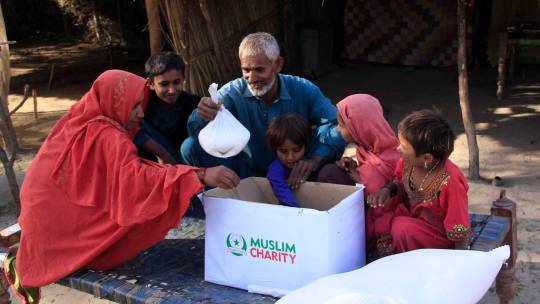
As the blessed month of Ramadan approaches, Muslims around the world eagerly anticipate a time of reflection, prayer, and most importantly, giving back to those in need. Ramadan is not only a period of fasting from dawn till dusk but also a time to strengthen bonds within communities and extend a helping hand to those less fortunate. At Muslim Charity, we are dedicated to embodying the true essence of Ramadan by launching our annual Ramadan Appeal, inviting you to join us in making a difference.
The Significance of Ramadan Giving:
Ramadan holds a special place in the hearts of Muslims worldwide. It is a time of spiritual growth, self-discipline, and empathy towards others. The act of giving, known as Zakat, is one of the Five Pillars of Islam and holds immense significance during this holy month. Muslims are encouraged to donate a portion of their wealth to those in need, fostering a sense of compassion and solidarity within the community.
Our Ramadan Appeal: Making an Impact Together:
At Muslim Charity, our Ramadan Appeal serves as an opportunity for individuals to contribute to meaningful causes and make a positive impact on the lives of others. Through our diverse range of projects and initiatives, we aim to address pressing issues such as poverty, hunger, education, and healthcare, both locally and globally.
1. Providing Food Security
During Ramadan, the importance of food becomes even more pronounced as fasting individuals eagerly await the breaking of their fast at sunset. However, millions around the world struggle with food insecurity every day. Through our Ramadan Appeal, we endeavor to provide nutritious meals to families in need, ensuring that they can experience the joy of sharing a meal together during this blessed month.
2. Supporting Education
Education is a fundamental right that empowers individuals and transforms communities. Yet, many children around the world are deprived of this basic necessity. Through our Ramadan Appeal, we support educational initiatives that provide underprivileged children with access to quality schooling, textbooks, and educational resources, paving the way for a brighter future.
3. Empowering Communities
At Muslim Charity, we believe in the importance of empowering communities to become self-sufficient and resilient. Through our Ramadan Appeal, we fund projects that promote sustainable livelihoods, vocational training, and entrepreneurship opportunities, enabling individuals to break the cycle of poverty and build a better life for themselves and their families.
How You Can Make a Difference:
Your support is vital in helping us achieve our Ramadan Appeal goals and uplift communities in need. There are several ways you can get involved and contribute to our cause:
1. Make a Donation: Every donation, no matter how big or small, makes a difference. Your generosity can provide food, education, healthcare, and hope to those who need it most.
2. Spread Awareness: Share our Ramadan Appeal with your friends, family, and social networks. By raising awareness about our cause, you can inspire others to join us in making a positive impact.
3. Volunteer: Get involved in our volunteer programs and lend your time and skills to support our projects on the ground. Whether it's organizing fundraising events or participating in community outreach activities, your contribution can create meaningful change.
Together, We Can Make a Difference:
As we prepare to embark on this sacred journey of Ramadan, let us remember the teachings of compassion, generosity, and solidarity. By coming together as a global community and supporting initiatives like Muslim Charity's Ramadan donation, we can make a tangible difference in the lives of those who are less fortunate. Let this Ramadan be a time of reflection, gratitude, and above all, a time of giving back to humanity.
Join us in embracing the spirit of giving and spreading hope and happiness to all. Together, let's make this Ramadan a truly blessed and transformative experience for everyone.
About Muslim Charity:
Muslim Charity is a registered international relief and development organization dedicated to tackling poverty and suffering around the world. With over 20 years of experience, we work tirelessly to provide emergency relief, sustainable development, and empowerment programs to communities in need, regardless of race, religion, or nationality. Join us in making a difference today.
2 notes
·
View notes
Text
As we stand on the brink of a technological revolution that will fundamentally alter the way we live, work, and relate to one another, the impact of artificial intelligence (AI) on the job market is a topic of intense debate and speculation. In this era of rapid change, understanding the potential shifts and preparing for the future is crucial for individuals and organizations alike.
The Double-Edged Sword of AI
AI's influence on the job market can be viewed as a double-edged sword. On one side, AI promises to enhance efficiency, reduce human error, and unlock new realms of innovation. Automation can take over mundane, repetitive tasks, freeing humans to focus on creative, strategic, and more meaningful work. This shift has the potential to improve quality of life and open up new career paths that we can scarcely imagine today.
On the other side, the rapid advancement of AI technologies brings the fear of job displacement. Roles that are heavily reliant on routine tasks, across sectors such as manufacturing, administrative work, and even certain aspects of customer service, are at risk. The concern is not just about job loss but also about the widening skills gap. As AI evolves, the demand for digital literacy, technical skills, and adaptability increases, leaving behind those who cannot keep pace.
The Sectors at the Forefront
The impact of AI will not be uniform across all sectors. Industries such as healthcare, finance, and education are poised for significant transformation. In healthcare, AI can assist in diagnosis, personalized treatment plans, and managing patient data, augmenting the capabilities of medical professionals. Finance will see smarter algorithms for risk assessment, fraud detection, and customer service. Education will benefit from personalized learning experiences and AI tutors, making education more accessible and tailored to individual needs.
However, these sectors will also face challenges, including ethical considerations, privacy concerns, and the need for robust regulatory frameworks to ensure that the deployment of AI technologies benefits society as a whole.
Preparing for the Future
The key to navigating the AI revolution in the job market lies in preparation and adaptability. For individuals, lifelong learning and skill development are paramount. Embracing a mindset of continuous learning and staying abreast of technological trends will be essential for career resilience. Skills in critical thinking, creativity, and emotional intelligence will become more valuable as these are areas where humans excel over machines.
For organizations, the focus should be on leveraging AI to enhance human work rather than replace it. This involves rethinking job roles, investing in employee training, and creating a culture that encourages innovation and adaptation.
Policymakers play a crucial role in ensuring a smooth transition into this new era. Implementing policies that support education and training programs, foster innovation, and protect workers' rights will be critical. Moreover, there's a need for dialogue between governments, businesses, and educational institutions to develop strategies that address the challenges and opportunities posed by AI.
The Path Forward
The AI revolution offers an opportunity to reimagine the future of work. While there are challenges ahead, proactive preparation and a focus on the human aspects of work can lead to a future where AI and humans coexist in synergy. By enhancing our unique human capacities and harnessing the power of AI, we can create a job market that is more dynamic, inclusive, and fulfilling for all.
2 notes
·
View notes
Text
Labor Challenges In Food Manufacturing

Introduction
The food manufacturing industry is the heart of our modern food supply chain, responsible for producing the vast array of products that fill our grocery store shelves. However, behind the scenes, this industry faces a host of labor challenges that impact not only its operations but also the quality and safety of the food we consume. In this blog post, we’ll explore some of the key labor challenges facing food manufacturers and the potential solutions to address them.
Workforce Shortages
One of the most pressing issues in the food manufacturing industry is workforce shortages. This challenge has been exacerbated by factors such as an aging workforce, high turnover rates, and the difficulty of attracting new talent. Food manufacturing facilities often require a diverse skill set, from food safety and quality control to machine operation and logistics, making it challenging to find qualified workers.
Solution: Companies can address this issue by investing in workforce development programs, offering competitive wages and benefits, and leveraging automation and technology to reduce the need for manual labor in repetitive or dangerous tasks.
2. Food Safety and Quality Assurance
Ensuring food safety and maintaining high-quality standards are paramount in food manufacturing. However, labor challenges can compromise these goals. A shortage of skilled workers can lead to mistakes in food handling and processing, increasing the risk of contamination and product recalls.
Solution: Comprehensive training programs, stricter adherence to safety protocols, and the implementation of advanced quality control technologies can help mitigate these risks.
3. Rising Labor Costs
Labor costs in the food manufacturing industry have been steadily rising, driven by factors such as minimum wage increases, healthcare costs, and worker demand for higher pay. Small and medium-sized manufacturers may find it particularly challenging to absorb these escalating costs.
Solution: To address rising labor costs, manufacturers can explore process optimization, automation, and robotics to increase efficiency and reduce the need for manual labor.
4. Regulatory Compliance
The food manufacturing industry is highly regulated to ensure the safety and quality of products. Compliance with these regulations is essential but can be a daunting challenge, especially for smaller businesses with limited resources. Keeping up with evolving food safety laws and industry standards is a constant struggle.
Solution: Companies can navigate regulatory challenges by investing in compliance management systems, regularly training employees on food safety standards, and staying informed about changes in regulations.
5. Labor Unions and Collective Bargaining
Labor unions play a significant role in the food manufacturing industry, and negotiations can lead to labor disputes, strikes, and work stoppages. These disruptions can impact production schedules and lead to losses in revenue.
Solution: Open and respectful communication between management and labor unions is key to preventing labor disputes. Collaborative bargaining and compromise can help maintain a stable workforce.
Conclusion
Labor challenges in food manufacturing are complex and multifaceted, but they are not insurmountable. By investing in workforce development, embracing automation and technology, prioritizing safety and quality, and adapting to changing regulations, food manufacturers can navigate these challenges more effectively. A resilient and skilled workforce is essential for ensuring the continued production of safe and high-quality food products that meet the demands of consumers in an ever-changing world.
https://www.linkedin.com/in/brian-twomey-4a017510/
6 notes
·
View notes
Text
Being free and open, even at considerable risk of being socially shamed (but what else is new?)
It's been a relief to blog and be more present/honest in therapy... but also in all sectors of my life.
--
I used to try to blog about my life in middle school and high school, but because I was holding on to so many family secrets (including my own childhood abuse) and closeted thoughts (I knew I was queer from an early age)... and also autistic masking... I could not be as open or even as vocal/descriptive. As a child, I was incredibly depressed and suicidal (my parents did not take me to get help even when I requested it until my high school forced them to take me in my senior year), so my peers would get scared and report me to high school counselors. I was underage - trying to openly talk about mental health, my identity exploration, my thoughts on my culture, sexuality, etc. It was tough to do openly. I often did so in private spaces, where I put myself at risk for abuse.
--
Historically, It has been hard for me to ask questions or be open with my thoughts. Not being able to ask questions definitely hindered my scientific training, but I pushed through somehow? There were so many times when I thought I'd fail... I'd simply scrape by.
Many people have thought my thoughts were silly. And worse, I thought my thoughts were silly. Even though I know now that EVEN IF my thoughts are silly, expressing my thoughts is part of how I process the world around me... and my thoughts are not facts written in stone.
--
When I started my PhD program and then met my ex-spouse... I honestly thought it could all change. I was so prolific with my Twitter account with my thoughts on my academic field of study - it was so freeing. I could write and present my scientific musings in educational settings - what a fantastic feeling. I could philosophically debate with my peers. And the more I became an expert, I was able to mentor and teach... and be opinionated! And I was and am respected for it.
But... I was still limited. I felt like I had to stay in the confines of what was socially and/or scientifically accepted.
I am changing that now. I'm talking with like-minded scientists about my thoughts, especially the ones I've researched and have experience in. I am not close-minded... and I want to grow. And I want to change things. I think I will somehow and someday. (For example, I want to add to the movement of changing gender and sex designations in collecting clinical healthcare data... among other things!)
--
And I honestly thought I could explore my gender, neurodivergence, and poly-tendencies with my ex-spouse. I thought we could do anything together. I thought we could grow together. I thought we would be together for this whole entire lifetime. I will be in pain about that loss for a while. And while I feel myself growing from that experience and finding myself again... that pain and also the love from our relationship will never diminish from who I am. I am simply growing around it. Becoming more expansive.
I am more than how people have treated me. I am not crazy or unreliable because I have strong feelings about things... and I'm not crazy for how I am, even if people don't understand autism or PTSD or being chronically ill.
--
More on all this, in the years to come... but as I fight through my trauma recovery and several moments of extreme depression... it has given me life and motivation to be able to share what I think, both in professional and personal settings.
It has helped me feel more human, connected to others, and integrated within myself. And thus, it has helped me feel less suicidal and less dissociated... I no longer want to burn myself out by being "resilient by masking or dissociating" to survive.
My survival hinges upon my healing, which is about being authentic and sharing who I am, my creations, and my various stories of how I lead this life.
#healing#trauma#neurodivergence#love#queer#self love#prose#being honest#being open#not masking#my boss calls it my candor#no more masking#autism#neurodivergent#adhd#survival#healing journey#i am entitled to share who i am and what has happened to me
5 notes
·
View notes
Text
Direct Admission in Mbbs Abroad: A Gateway to Global Medical Education

Introduction:
In today's competitive world, pursuing a career in medicine has become a dream for many aspiring students. However, due to limited seats and intense competition in domestic medical colleges, more and more students are looking for opportunities to secure direct admission in MBBS abroad.
Why Choose Direct Admission in MBBS Abroad?
Direct admission in MBBS abroad opens up a world of possibilities for students who aspire to become successful medical professionals. Here are a few reasons why opting for overseas education can be a game-changer.
Affordable Tuition Fees: Many countries offering direct admission in MBBS abroad have significantly lower tuition fees compared to domestic institutions. This cost advantage attracts students from various financial backgrounds who may find it difficult to afford the exorbitant fees of private medical colleges or universities in their home countries.
No Entrance Exams: One of the primary advantages of pursuing MBBS abroad is the absence of entrance exams. While securing admission in prestigious medical colleges domestically can be challenging and require exceptional scores in entrance tests, universities abroad often offer direct admission based on merit or other criteria.
Global Exposure and Diversity: Studying MBBS abroad exposes students to diverse cultures, languages, and medical practices. They get the opportunity to interact with peers from different nationalities, exchange ideas, and gain a broader perspective on healthcare.
International Recognition and Accreditation: Many renowned medical universities abroad are recognized by global accreditation bodies like the World Health Organization (WHO), the Medical Council of India (MCI), and the General Medical Council (GMC) in the United Kingdom.
Diverse Learning Environment: Another significant advantage of pursuing MBBS abroad is the exposure to a diverse learning environment. International medical universities attract students from various countries, creating a multicultural and inclusive atmosphere. Interacting with classmates from different backgrounds enhances cross-cultural understanding and promotes a global perspective on healthcare.
Advanced Infrastructure and Technology: Many universities offering direct admission in MBBS abroad boast state-of-the-art infrastructure and cutting-edge technology. These institutions prioritize investing in modern facilities, well-equipped laboratories, and advanced medical equipment.
Quality of Education: Renowned universities abroad often have a reputation for providing high-quality education. These institutions employ experienced faculty members who are experts in their respective fields.
Clinical Exposure and Practical Training: Opportunities for Research and Specialization: Several international universities encourage research and offer opportunities for students to engage in scientific studies. By participating in research projects, students can contribute to medical advancements and gain a deeper understanding of specific areas of interest.
Enhanced Language Skills: Studying MBBS abroad often involves learning in a different language. This experience not only helps students develop proficiency in a foreign language but also enhances their communication skills. Effective communication is crucial in the medical field, as it enables doctors to understand patients and convey medical information accurately.
Personal and Professional Growth: Pursuing MBBS abroad is not only about academic excellence but also about personal and professional growth. Living in a foreign country exposes students to new challenges and experiences, promoting independence, adaptability, and resilience.
Conclusion:
Direct admission in MBBS abroad offers a viable pathway for students to realize their dreams of becoming doctors without the barriers of intense competition and complex admission processes. The benefits of affordable tuition fees, international exposure, and global recognition make pursuing an MBBS degree overseas an attractive option for aspiring medical professionals.
3 notes
·
View notes